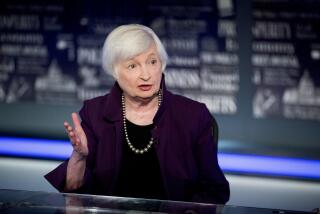Political gridlock over U.S. debt not just America’s problem
World financial leaders have been warning for weeks that the U.S. congressional gridlock over funding the government and raising the debt ceiling are imperiling economies worldwide and undermining confidence in the U.S. dollar.
Even the news Wednesday that the partisan battle was about to be suspended until early next year has done little to spare U.S. leaders damage to their reputation as responsible stewards of the No. 1 global economy, analysts warned.
China and Japan are the largest foreign holders of U.S. Treasury bills, with $1.3 trillion and $1.1 trillion, respectively, of Washington’s outstanding debt, according to International Monetary Fund data. That makes them the most exposed in the event -- once considered unimaginable but nowadays less so -- that the U.S. Congress fails to raise the debt ceiling by Thursday, when U.S. obligations are expected to exceed the current $16.7-trillion limit.
But with U.S. dollar securities accounting for 62% of all foreign currency reserves in central banks around the world, the recurring threat of default is driving international investors to eye alternative currencies as safer financial havens.
Global markets have been relatively calm in the midst of the political standoff in Washington as investment managers have been “assigning a small probability” of default, writes Amadou Sy, the Brookings Institution‘s senior fellow for global economy and development.
“But this is a very dangerous game as it has repercussions both within and outside the U.S.,” Sy said, citing an erosion of confidence in Washington fiscal management and the stability of the dollar.
Even flirting with the idea of leaving the U.S. government with no means to borrow threatens an escalating global crisis, the Treasury Department warned this month.
“Credit markets could freeze, the value of the dollar could plummet, and U.S. interest rates could skyrocket, potentially resulting in a financial crisis and recession that could echo the events of 2008 or worse,” the department said in its Report on Macroeconomic Effect of Debt Ceiling Brinkmanship.
A similarly bruising battle in Congress over the debt ceiling two years ago led credit-rating agency Standard & Poor’s to downgrade the U.S. government’s AAA rating. The other two major U.S. credit-rating institutions, Moody’s and Fitch, retained the government’s outstanding rating, but later that year they revised their outlook to negative. On Tuesday, Fitch announced that it was considering a downgrade.
“The announcement reflects the urgency with which Congress should act to remove the threat of default hanging over the economy,” China’s official New China News Agency reported, quoting a Treasury spokesperson, on an issue that is of vital interest in Beijing because of China’s exposure.
U.S. lawmakers’ bitter standoff over funding the federal government and raising the amount the country can borrow was the subject of deep concern at last weekend’s annual meeting of the World Bank and International Monetary Fund in Washington. IMF Managing Director Christine Lagarde warned of “massive disruption the world over” should the U.S. fail to extend its borrowing authority and put the country’s creditworthiness in doubt.
Lagarde, in an address to Fortune magazine‘s Most Powerful Women Summit in Washington on Tuesday night, blasted the “stopgap” approach U.S. lawmakers have taken to resolving fundamental economic policy disputes with short-term delays and then “back to the drawing board once again.”
That, the IMF chief said, would simply “reactivate the same sort of trepidation and anxiety and worry” that have followed the recurring bouts of debate and procrastination.
British economist Neil Mackinnon similarly criticized the “ongoing fiscal dysfunction” gripping Washington. Political discord and uncertainty over whether the U.S. government can pay its debts “undermines global confidence in the U.S. economy” and inflicts damage to the economies of other countries holding U.S. securities, Mackinnon told Russia Today in an interview carried Wednesday.
ALSO:
Greece turns up pressure on neo-fascist Golden Dawn
Central African Republic forces attacking civilians, agencies say
Israel awards USC professors $1-million prize for energy research
A foreign correspondent for 25 years, Carol J. Williams traveled to and reported from more than 80 countries in Europe, Asia, the Middle East and Latin America.
More to Read
Sign up for Essential California
The most important California stories and recommendations in your inbox every morning.
You may occasionally receive promotional content from the Los Angeles Times.











